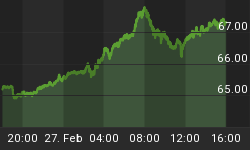Japan's prime minister Shinzo Abe managed to get prices to rise. He did that with his policy to destroy the Yen even though Japan is heavily dependent on foreign oil and food imports.
Interestingly, Abe is not precisely pleased with the results. Abe now complains that wages are not keeping up with prices. He wants a wage-price spiral on top of it all.
The Financial Times reports Bank of Japan minutes expose fears over lack of wage rises.
Board members at the Bank of Japan have expressed fears that wages are not keeping pace with higher consumer prices, as the world's third-largest economy tries to haul itself out of more than a decade of deflation.Minutes of the October 3-4 meeting published on Wednesday showed that members of the policy board agreed it was important that improvements in income keep supporting consumption, which was the main driver of Japan's strong growth in the first half of 2013.
If inflation keeps ticking upwards - as the BoJ's official forecasts suggest - then real incomes would fall, threatening momentum in the economy and casting doubt over the bank's longer term inflation target of 2 per cent.
The disclosure of anxieties at the heart of the central bank is likely to increase pressure on the government to extract concessions from Keidanren, the most powerful of Japan's business groups, which has not recommended a rise in total labour costs since the Lehman crisis.
Shinzo Abe, prime minister, said in October that higher wages were vital to create a "virtuous circle" that spurs consumption and investment. A government forum has met twice with private-sector representatives, including executives from Keidanren, to discuss tax cuts in return for wage increases.
In October, the Japanese Trade Union Federation, the nation's biggest labour group, said it would take a basic pay-rise demand of at least 1 per cent into the spring labour talks.
"If citizens' income fails to grow with prices increasing, society will plunge into turmoil," said Nobuaki Koga, president of the federation. "Income must be raised."
For now, evidence of a turnround in pay remains thin. Government data last week showed that regular wages excluding overtime and bonuses fell 0.3 per cent in September compared with a year earlier, marking a 16th consecutive month of decline.
Meanwhile, the weaker yen pushed up consumer price inflation to a five-year high of 0.8 per cent in August, effectively sapping households' purchasing power.
Naming and Shaming
Pragmatic Capitalism reports Abe Gets Ready to Start "Naming and Shaming"
Apparently Abe has had enough. According to TV Tokyo, Abe will begin pressuring business leaders directly to raise wages. The goal is to start with a corporate wage survey. How would a survey help? In Japan if the survey is published with the companies' names shown, the strategy of "naming and shaming" just might work."
Shame Shame
I happen to have a musical tribute to such nonsense.
Shame Shame- The Magic Laterns- 1968
"Virtuous Circle" of Nonsense
Incomes are not keeping up with inflation, so Abe wants wants wages to go up. The irony in this madness is "real" wages were rising as prices fell. And consumers everywhere are perfectly happy with falling prices.
It's monetarist fools and government bureaucrats who don't like falling prices.
But here's the deal. Central banks can print money but they cannot dictate where it goes. And typically printing spawns asset bubbles as we saw three decades ago in Japan (which is what triggered Japan's deflationary collapse in the first place).
The same thing happened in the US with the Fed-sponsored Dot-Com boom, the Fed-Sponsored housing bubble, and the Fed-sponsored equity-and-bond bubble now underway.
Who Benefits From Inflation?
The only ones to benefit from this alleged "virtuous circle" are the bankers and those with first access to money.
For further inflation reading and who benefits from it, please see ...
- Illusion of Prosperity: Deflating the American Dream; No Recovery in "Real" Income
- Reader Asks Me to Prove "Inflation Benefits the Wealthy" (At the Expense of Everyone Else)
- The Morning After; Price Discovery is Zero; PUT on the Bond Market? Is Inflation Really Under 2%?
- Does Inflation Targeting Make Any Sense?
- Inflation Targeting Revisited; Three Major Fed-Sponsored Bubbles; Who Benefits From Inflation?















